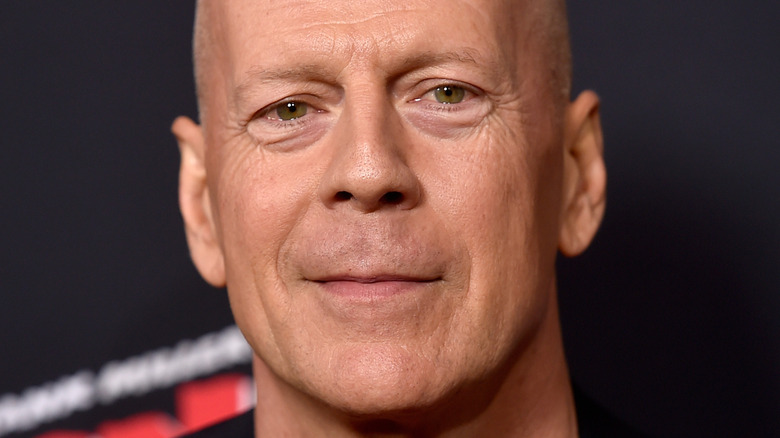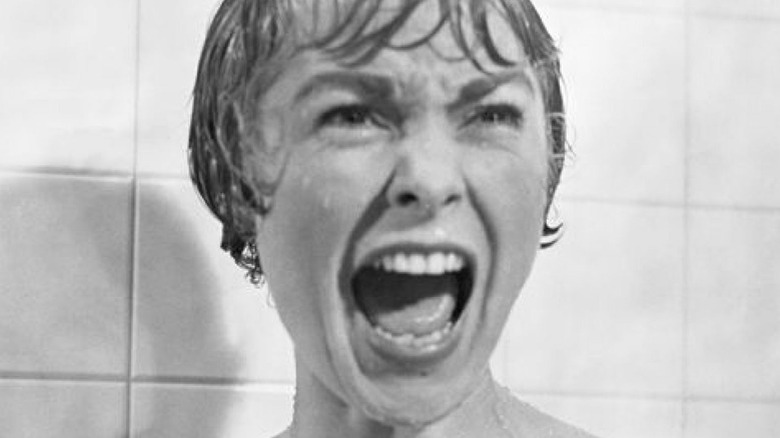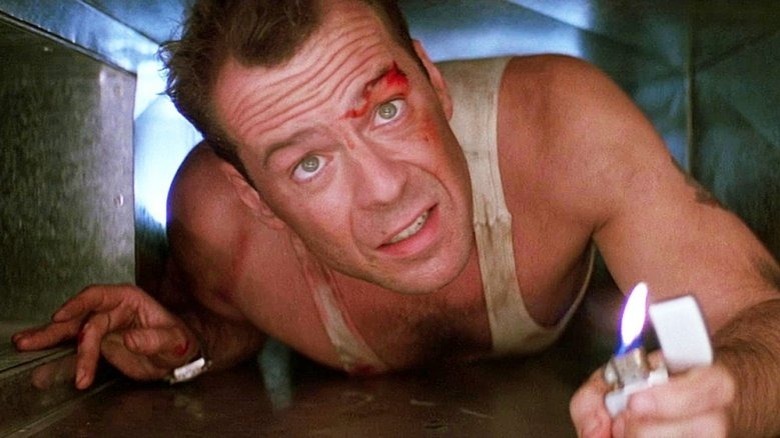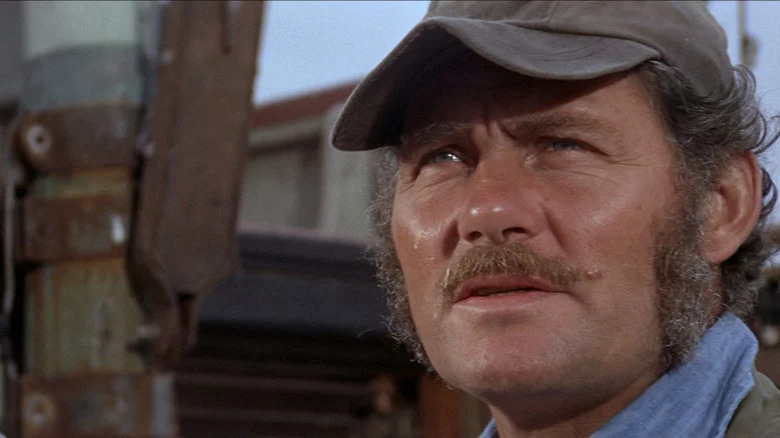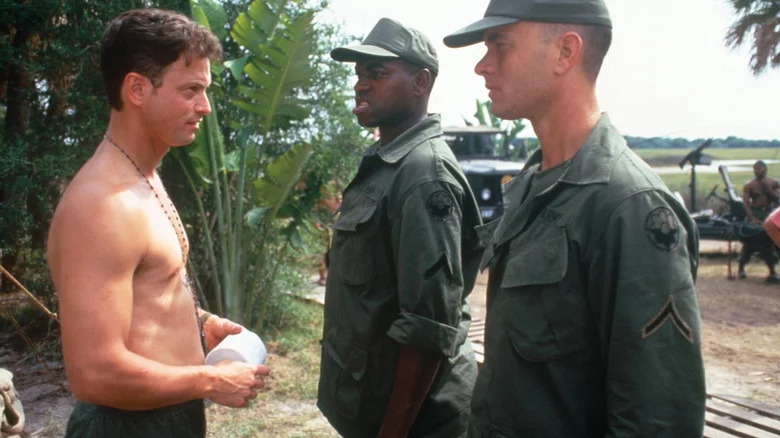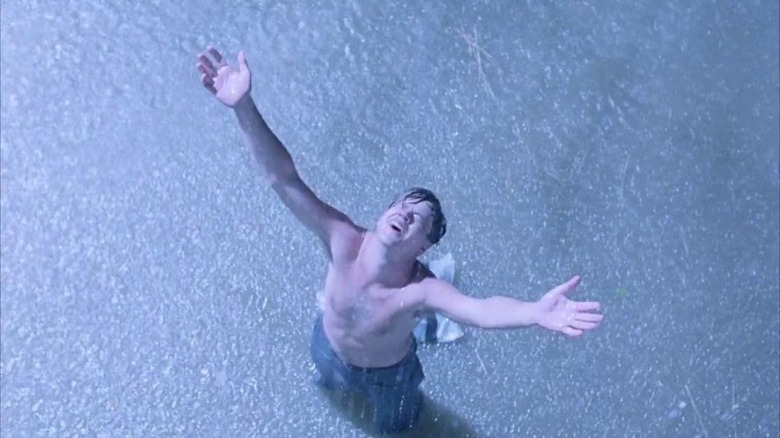Five Times The Movie Was Actually Better Than The Book
If you've ever watched a movie or TV show based on a popular book, you'll probably run into plenty of people who'll argue that the book is better. Often, this is a perfectly understandable argument. After all, Peter Jackson's "The Lord of the Rings" trilogy might be amazing, but at the end of the day, it's still just a film version of J.R.R. Tolkien's esteemed works.
However, the fact that books exist before their film adaptations doesn't always mean that the movie is destined to play the second fiddle. There are movies out there that have managed to take the source material, and either improve, expand, or distill it to the point that they become the definitive version of the story in the cultural zeitgeist. In some cases, this is because the book leaves a lot to be desired, so the movie can easily take whatever works in the original, and build a superior work around that solid core. Other times, the book is already pretty good, but the movie just manages to be so great that it towers over the novel it's based on.
Let's take a look at some of the best examples of the movie being better than the book.
Alfred Hitchcock's vision raises Psycho above the novel version
Alfred Hitchcock's "Psycho" is an amazing suspense movie. The movie's impactful shower scene, unforgettable plot twists, and sheer cinematic prowess have endeared it to critics and audiences alike (via Rotten Tomatoes), and it remains a horror movie staple over six decades after its original release. Critics like Owen Gleiberman of Entertainment Weekly and Stephen Robb of BBC News have praised "Psycho's" genre-transcending impact. All in all, it's a movie well worth watching and analyzing.
In a book versus movie fight, it's a good thing that Hitchcock's "Psycho" is such a masterpiece. After all, Robert Bloch's original novel is no slouch, either, with its four-star Goodreads rating and a plot that is, well, "Psycho." However, the book simply doesn't have a similar cultural status as the movie version, which — along with the film's sheer cinematic prowess — is more than enough to raise it above and beyond the written word.
Die Hard took the source material and forged a classic action movie
One of the best ways to know that a movie has managed to outshine the book it was based on is when people might not even know that there's a book behind the tale. John McTiernan's 1988 action classic "Die Hard" introduced the world to the action hero abilities of "Moonlighting" star Bruce Willis, as well as the villainous talent of Alan Rickman — in Rickman's first big-screen role, no less. A story so reliant on its intensely charismatic cast and lovingly created tension doesn't seem like it could exist as anything other than a movie — but nevertheless, the untold truth of "Die Hard" is that it was a book first.
Well, kind of. According to "Die Hard: An Oral History (via Maxim), the story of "Die Hard" comes from crime writer Roderick Thorp's 1979 book "Nothing Lasts Forever," which itself was a sequel to his 1966 book "The Detective." The thriller's basic premise and certain key events are quite similar to "Die Hard," but the novel is a grim affair that involves little of the movie's signature smirk, and its twists and turns are far more tragic.
Given "Die Hard's" ironclad pop culture status and the fact that "Nothing Lasts Forever" pops up in oral histories of the film instead of the other way around, the deck is pretty stacked against the book, here — especially since the movie and its and background machinations changed the way action movies were made, and Willis' everyman character paved the way to a new kind of action hero (via Vulture).
Steven Spielberg's Jaws eats up the book version
Another novel that has been somewhat steamrolled by the classic movie it was adapted into, "Jaws" started its life as a 1974 thriller by Peter Benchley. Critics didn't always love the book — in fact, outlets like Time and The New York Times pointed out various flaws in its writing and narrative. The public, however, loved the story, to the point that "Jaws" spent the vast majority of 1974 on the New York Times bestseller list (via Slate). The success of the shark book, of course, warranted a shark movie — a shark movie that blew the book right out of the water.
Seeing the film version of "Jaws" in 1975 was a powerful experience at the time, and as its impressive Metacritic score of 87 proves, it remains essential watching. The Steven Spielberg film also managed to deliver on the success front, having earned a ridiculous worldwide box office total of $414 million against a $7 million budget. "Jaws" remains a common sight whenever the best movies of all times are listed, and its great cast and stellar suspense techniques make it the blueprint of the essential blockbuster thriller.
The book version of Forrest Gump goes bigger, but the movie is better
"Forrest Gump" the movie should need no introduction. Robert Zemeckis' 1994 film is the proud winner of six Academy Awards (via IMDb), and Tom Hanks' warm-hearted portrayal of the titular character is as touching as it is entertaining.
Winston Groom's 1986 book, also titled "Forrest Gump," has the same overall plot as the book, but didn't exactly make a similar impact when it came out. In fact, Kirkus Reviews and Publisher's Weekly both expressed their disappointment in the book, compared to Groom's other works.
Apart from the book's comparative lack of critical love, fans of the movie will also be surprised to find that the original Forrest Gump is a very different character from Hanks' gentle version. Here, Forrest is a rough and imposing 6'6" man with an instinctive penchant for math. His storyline is much grittier and more complex than his film counterpart's, and involves things like cannibals, space missions, and pro wrestling. It's certainly a ride — but as the book's and movie's respective plaudits show, the film version reigns supreme.
Even Stephen King considers The Shawshank Redemption an American classic
Frank Darabont's "The Shawshank Redemption" flopped at the box office, but later established its status as a true home entertainment classic. The story of Andy Dufresne (Tim Robbins), Red Redding (Morgan Freeman), and a particularly strange prison escape earned seven Academy Award nominations and won many other awards (via IMDb), but did it impress the one man it really needed to?
The movie is based on Stephen King's novella "Rita Hayworth and Shawshank Redemption," and fortunately, the horror master himself shares the public's stellar opinion of the film. In 2014, King wrote about the movie for the Academy Awards website, and showered it with some pretty high praise.
"When I first saw it, I realized he'd made not just one of the best movies ever done from my work, but a potential movie classic," King wrote, in praise of Darabont's work at the movie's helm. "He's gone on to make other great films, two from my work, I'm happy to say, but 'Shawshank' is its own thing — an American icon — and I'm delighted to have been a part of it."
When King himself is happy to call a movie adaptation of one of his lesser-known works an American icon, it's probably fair to say that the film version has quite comfortably surpassed the source material.
